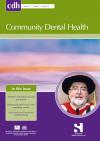Community Dental Health

- Cover Date:
- June 2015
- Print ISSN:
- 0265 539X
- Vol:
- 32
- Issue:
- 2
A pilot project to improve the oral health of orphans and of the elderly in residential care in Constanta, Romania
© BASCD 2014 doi:10.1922/CDH_3435Zusman04
A pilot project to improve the oral health of orphans and of the elderly in residential care in Constanta, Romania
S.P. Zusman, K.A. Eaton, M. Harris and C. Amariei
Aim: A pilot project to improve the oral health of Romanian orphans and elderly people in residential homes. Material and Methods: The orphanage and old persons’ home were in Constanta. After training, 50 fifth-year dental students made 14 weekly residential home visits to improve carers’ oral health knowledge and oral hygiene (OH) procedures and to monitor progress in one orphan and one old person. At baseline and after 14 weeks a local dental school staff member examined each orphan and old person’s oral health using WHO (1997) criteria and the Simplified Oral Hygiene Index (OHI-S). The carers’ knowledge of OH and attitudes to providing and the students’ knowledge and attitudes were assessed at baseline and again after 14 weeks with a questionnaire. Results: All 56 orphans (mean age 9.6 years, mean DMFT 2.39) living in the home participated and their mean OHI-S improved (1.40 to 0.80, p<0.0001). Fifty old people (mean age 75.9 years) participated, of whom 22 (44%) were edentulous. There was no significant improvement in mean OHI-S (p<0.10). The carers’ oral health knowledge improved (mean scores from 65 to 88, p<0.001) as did their attitude score (p<0.013). Students noted changes in their understanding of the needs of the carers, orphans and elderly people. Their perception of their capability to provide OH education or train others to do so, or their inclination to do so remained substantially unchanged. Conclusions: This pilot study met its aims suggesting that with suitable management, senior dental students can play a significant role in residential homes for orphans and old people by training carers and improving the residents’ oral hygiene. Further similar studies in other settings are indicated.
Key words: oral health promotion, disadvantaged children, orphans, elderly, carers, dental students, Romania
- Article Price
- £15.00
- Institution Article Price
- £
- Page Start
- 89
- Page End
- 92
- Authors
- S.P. Zusman, K.A. Eaton, M. Harris, C. Amariei
Articles from this issue
- Title
- Pg. Start
- Pg. End
- Dentists’ knowledge of oral health during pregnancy: a review of the last 10 years’ publications
- 77
- 82
- A pilot project to improve the oral health of orphans and of the elderly in residential care in Constanta, Romania
- 89
- 92
- The association between parents’ perceived social norms for toothbrushing and the frequency with which they report brushing their child’s teeth
- 98
- 103
- Are Stage of Change constructs relevant for subjective oral health in a vulnerable population?
- 111
- 116
